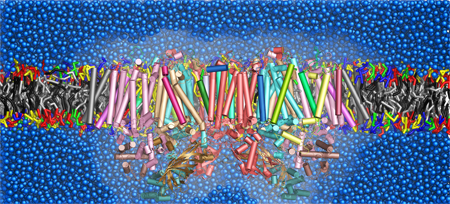Photosystems in thylakoid membranes
Photosynthesis is the extremely important process in which solar energy is harvested and converted into chemical energy. Virtually all life on earth is dependent on this process. The light-dependent photosynthetic reactions take place in the so called thylakoid membrane, which is an internal membrane of the chloroplast. This membrane is composed of some very special glycolipids and hosts the protein complexes involved in photosynthesis. The length and time scales at which photosynthesis occurs make it challenging to study it both experimentally and on an all-atom level. A coarse grained approach using Martini allows one to explore larger time and length scales.
The goal of this research is to study the behaviour of the Photosystem II (PSII) protein complex, which is shown below embedded in the thylakoid membrane. PSII harvests solar light and produces the oxygen we breathe, it is therefore an extremely important protein. PSII is embedded in the thylakoid membrane. In order to better understand the behaviour of PSII, we have studied the thylakoid membrane by itself to see if the different lipids mix well and to study their phase behavior [1]. Now, we are investigating the stability of the different subunits of PSII, the cofactor mobility and differences between the PSII dimer and monomer. Additionally, the group aims to study the interactions the complex makes with the thylakoid membrane and the diffusion of electron carriers through the complex.
[1] F.J. van Eerden, D.H. de Jong, A.H de Vries, T.A. Wassenaar, S.J. Marrink. Characterization of thylakoid lipid membranes from cyanobacteria and higher plants by molecular dynamics simulations. BBA Biomembranes, 1848:1319–1330, 2015.

| Last modified: | 25 June 2015 01.49 a.m. |
